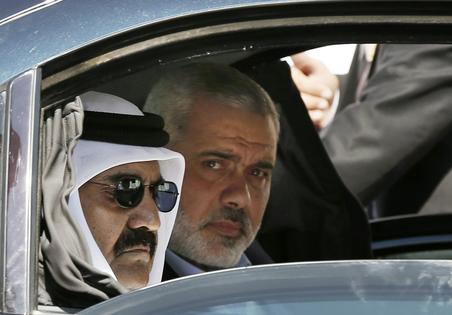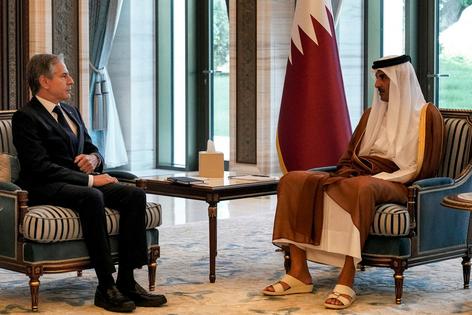Qatari mediation was already producing diminishing returns – assassination of Hamas negotiator further erodes Gulf state’s role
Published in Political News
When the longtime political chief of Hamas was assassinated in late July 2024, it didn’t just leave the entire Middle East on edge. It also created a political headache in Qatar.
That’s because the death of Ismail Haniyeh, the result of an apparent Israeli operation, struck a blow to Doha’s already sputtering diplomatic efforts in the Middle east.
The Gulf state has long been the staging ground for negotiations involving Israelis and Palestinians, including Haniyeh, who lived in Qatar. But recent criticism from the U.S. and Israel for, in their view, failing to put enough pressure on Hamas had led Qatar’s leaders to question its role.
And then came Haniyeh’s death.
“How can mediation succeed when one party assassinates the negotiator on the other side?” pondered Qatar’s prime minister and top diplomat, Sheikh Mohammed bin Abdulrahman Al Thani. Israel is widely believed to be behind the assassination, although no claim of responsibility has been made.
As an expert on Gulf politics, I believe bin Abdulrahman’s question is a valid one. As the first anniversary of the Oct. 7 attack in Israel approaches, Qatari officials face a challenge. Mediation has produced diminishing returns – both for the warring parties and for Qatar itself. But moving away from mediation would represent a seismic shift for Qatar, which has put it at the heart of its foreign policy for decades.
Qatar is a small state in a volatile neighborhood. Over the past 45 years, the region has experienced multiple interstate wars and periods of revolutionary upheaval. Throughout that time, successive generations of Qatari leaders have looked toward diplomacy and mediation as a way to advance the country’s interests.
Indeed, Qatar’s constitution, in effect since 2004, requires a foreign policy “based on the principle of encouraging peaceful resolution of international disputes.”
Such a formal commitment to dispute resolution marks Qatar as distinct from most of its Gulf peers. But the approach is rooted in a pragmatic calculation of how and where a small country can best exercise leverage in regional and foreign policy.
In this way, Qatari officials have worked as mediators for two decades.
Initially, they found success, helping resolve in 2008 a particularly intractable political crisis in Lebanon, which appeared to be heading to civil war. The breakthrough in Lebanon and a two-year stint on the United Nations Security Council in 2006 and 2007 helped put Qatar on the diplomatic map.
But Qatar’s negotiating efforts haven’t always worked out. Qatari officials failed to facilitate breakthroughs between warring Sudanese factions in Darfur in 2011 and between the Houthis and the central government in Yemen’s decadelong civil war since 2014.
Much of the early mediation efforts were led by the veteran foreign minister Sheikh Hamad bin Jassim Al Thani, who was also appointed prime minister in 2007.
Bin Jassim engaged in a personalized style of policymaking based on his vast range of international contacts and his ability to lean on Qatari entities, such as the Qatar Investment Authority, in his diplomatic efforts.
Bin Jassim stepped down as both prime and foreign minister in June 2013 as part of a carefully planned handover of power to the current emir of Qatar, Sheikh Tamim bin Hamad Al Thani.
By this time, the Qatari leadership was facing a backlash from neighbors such as Saudi Arabia and the United Arab Emirates over what they viewed as Qatari support or sympathy for Islamist movements during the multinational series of uprisings known as the Arab Spring.
In 2017, the Saudis and Emiratis, along with Bahrain and Egypt, cut diplomatic ties with Qatar and accused Doha – without evidence – of supporting regional terrorist groups.
But such criticism didn’t deter Qatar from its policy of mediation as diplomacy. Rather, in the decade since the 2013 political transition in Doha, Qatari mediation has evolved and expanded. In 2023, a new position of Minister of State for International Cooperation was created within the Foreign Ministry, giving greater institutional depth and professional capability to policymaking.
Qatar’s mediation efforts have also evolved away from the unilateral actions involving Islamist groups that raised regional concerns during the Arab Spring.
Instead, Qatari officials have acted at the request of other countries to serve as potential mediators.
In this way, the Gulf state worked intensively with the U.S. and representatives from the Taliban in a process that culminated in the 2020 Doha Agreement that set a timeline for U.S. withdrawal from Afghanistan.
It similarly worked with Israeli officials to facilitate financial and humanitarian support for the Gaza Strip in the five years prior to the Hamas-led attacks of Oct. 7.
But since that assault and the Israeli operation in Gaza that followed, Qatari mediation has had only limited success.
It was instrumental in negotiating the temporary cease-fire in November, but fighting quickly resumed and the devastation of Gaza intensified soon after.
Meanwhile, both U.S. and Israeli politicians have attacked Qatar for continuing dialogue with Hamas.
That criticism led the Qatari prime minister to warn in April that Doha may reassess its role in Gaza as a result.
Four months on, the killing of Haniyeh has narrowed still further the pathway for further diplomacy. Haniyeh, like his predecessor as head of the Hamas Political Bureau, Khaled Mashal, had a base in Doha.
The man appointed to succeed Haniyeh in that role, hardliner Yahya Sinwar, is believed to be in a tunnel in Gaza and cannot reasonably hope to be in Doha given the current circumstances.
Following Haniyeh’s death, the White House did reach out to Qatar to thank the nation for its mediating efforts, but it’s increasingly difficult to see how Qatar can broker any breakthrough.
Talks will continue. Israeli and Egyptian officials met in Cairo on Aug. 3, after Haniyeh’s assassination, without Qatari representation. But negotiations broke down after Israeli Prime Minister Benjamin Netanyahu reportedly imposed new demands.
With the dominant view in Doha that Israeli leadership simply isn’t willing to engage in good-faith talks, still less reach a cease-fire deal, officials in Qatar are likely to focus on mitigating any Iranian response against Israel. This began with an emergency meeting of the Organization of Islamic Conference members, including Iran, in Jeddah in Saudi Arabia on Aug. 7.
With no viable political strategy for a Gaza cease-fire currently in place, de-escalating tensions involving Iran – rather than trying to broker peace between Palestinians and Israelis – will dominate Qatar’s approach in the days and weeks ahead.
This article is republished from The Conversation, a nonprofit, independent news organization bringing you facts and trustworthy analysis to help you make sense of our complex world. It was written by: Kristian Coates Ulrichsen, Rice University
Read more:
Saudi plans to ‘de-risk’ region have taken a hit with Gaza violence − but hitting pause on normalization with Israel will buy kingdom time
Oman serves as a crucial back channel between Iran and the US as tensions flare in the Middle East
Assassination is always unlawful − regardless of who is killed and on whose orders
Kristian Coates Ulrichsen does not work for, consult, own shares in or receive funding from any company or organization that would benefit from this article, and has disclosed no relevant affiliations beyond their academic appointment.
































































Comments